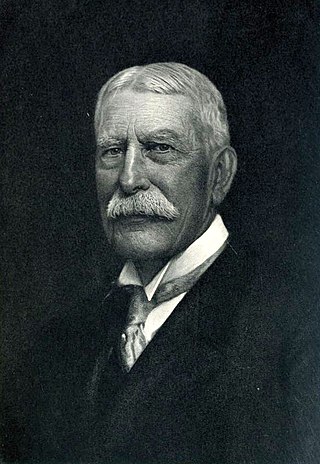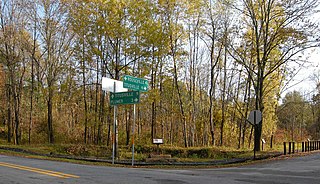This article needs additional citations for verification .(May 2024) |
McClintockville, Pennsylvania was a small community in Cornplanter Township in Venango County located in the state of Pennsylvania in the United States.
This article needs additional citations for verification .(May 2024) |
McClintockville, Pennsylvania was a small community in Cornplanter Township in Venango County located in the state of Pennsylvania in the United States.

Venango County, Pennsylvania was home to an oil boom in the years following discovery of natural oil (petroleum) in the mid-1850s.
George Bissell, a Yale University chemistry professor, and Edwin L. Drake, a former railroad conductor, made the first successful use of a drilling rig on August 28, 1859 at Titusville, Pennsylvania. This single well soon exceeded the entire cumulative oil output of Europe since the 1650s. The principal product of the oil was kerosene.
In 1861, McClintockville was the location of Rogers & Ellis, the first business venture of Henry Huttleston Rogers, who became a leading American businessman, industrialist and financier, with his partner Charles P. Ellis. [1] Rogers and his young wife Abbie Palmer Gifford Rogers lived in a one-room shack there along Oil Creek for several years.
Shortly later, Rogers met oil pioneer Charles Pratt who purchased the entire output of the tiny Wamsutta Oil Refinery. In 1867, Rogers joined Pratt in forming Charles Pratt and Company, which was purchased by Standard Oil in 1874. Rogers became one of the key men in John D. Rockefeller’s Standard Oil Trust.
After joining Standard Oil, Rogers invested heavily in various industries, including copper, steel, mining, and railways. The Virginian Railway is widely considered his final life's achievement. Rogers amassed a great fortune, estimated at over $100 million, and became one of the wealthiest men in the United States.
He was also a generous philanthropist, providing many public works for his hometown of Fairhaven and financially assisting helping such notables as Mark Twain, Helen Keller, and Booker T. Washington.
Near McClintockville and Oil City, in western Pennsylvania, there is a Pennsylvania State Park and many heritage sites to tell the story and memorialize the people of the oil boom of the late 19th and early 20th centuries.

Venango County is a county in the Commonwealth of Pennsylvania. As of the 2020 census, the population was 50,454. Its county seat is Franklin. The county was created in 1800 and later organized in 1805. The county is part of the Northwest Pennsylvania region of the state.

Cornplanter Township is a township in Venango County, Pennsylvania, United States. The population was 2,317 at the 2020 census, a decrease from 2,487 at the 2010 and 2,687 at the 2000 census.

Franklin is a city in and the county seat of Venango County, Pennsylvania, United States, located at the confluence of French Creek and the Allegheny River. The population was 6,097 in the 2020 census. Franklin is part of the Oil City micropolitan area.

Oil City is the largest city in Venango County, Pennsylvania, United States. Known for its prominence in the initial exploration and development of the petroleum industry, it is located at a bend in the Allegheny River at the mouth of Oil Creek. The population was 9,608 at the 2020 census, and it is the principal city of the Oil City micropolitan area.

Henry Morrison Flagler was an American industrialist and a founder of Standard Oil, which was first based in Ohio. He was also a key figure in the development of the Atlantic coast of Florida and founder of the Florida East Coast Railway. He is also known as a founder of the cities of Miami and Palm Beach, Florida.

Henry Huttleston Rogers was an American industrialist and financier. He made his fortune in the oil refining business, becoming a leader at Standard Oil. He also played a major role in numerous corporations and business enterprises in the gas industry, copper, and railroads. He became a close friend of Mark Twain.

Charles Pratt was an American businessman. Pratt was a pioneer of the U.S. petroleum industry, and he established his kerosene refinery Astral Oil Works in Brooklyn, New York. He then lived with his growing family in Clinton Hill, Brooklyn. He recruited Henry H. Rogers into his business, forming Charles Pratt and Company in 1867. Seven years later, Pratt and Rogers agreed to join John D. Rockefeller's Standard Oil.

Charles Pratt and Company was an oil company that was formed in 1867 by Charles Pratt and Henry H. Rogers in Brooklyn, New York. It became part of John D. Rockefeller's Standard Oil organization in 1874.
Wamsutta Oil Refinery was established around 1861 in McClintocksville in Venango County near Oil City, Pennsylvania, in the United States. It was the first business enterprise of Henry Huttleston Rogers (1840–1909), who became a famous businessman, industrialist and financier.

Astral Oil Works was an American oil company specializing in illuminating oil, and based in Brooklyn, New York. Astral Oil was a high-quality kerosene used in lamps and noted for being relatively safe. It was founded by Charles Pratt. Charles Pratt and Company became part of John D. Rockefeller’s Standard Oil Trust in 1874, although the fact that Astral Oil was a New York branch of Standard Oil in Ohio was not made public until 1892.

Pithole, or Pithole City, is a ghost town in Cornplanter Township, Venango County, Pennsylvania, United States, about 6 miles (9.7 km) from Oil Creek State Park and the Drake Well Museum, the site of the first commercial oil well in the United States. Pithole's sudden growth and equally rapid decline, as well as its status as a "proving ground" of sorts for the burgeoning petroleum industry, made it one of the most famous of oil boomtowns.

The French Creek Council serves Boy Scouts in six counties in northwestern Pennsylvania and one township in Ohio. The council was organized in 1972 from a merger of the former Washington Trail Council of Erie, Custaloga Council of Sharon and Colonel Drake Council of Oil City, Pennsylvania. It has headquarters in Erie, Pennsylvania.
Tri-City Raceway Park is a 1/2-mile dirt oval and a 3/8-mile track for karts, located in Oakland Township, Venango County, Pennsylvania, near the city of Franklin to the southwest. It lies even closer to the Borough of Sugarcreek, which lies in between. Also lying at about the same distance as Franklin is Oil City to the southeast. Tri-City has hosted several World of Outlaws Late Models events; one National Sprint Tour race, Super DIRTcar Series and several All-Star Circuit of Champions races.
WFRA is an American radio station that is licensed to Franklin, Pennsylvania; the seat of government for Venango County, Pennsylvania.

Petroleum Center is a populated place and ghost town in Cornplanter Township, Venango County, Pennsylvania, United States. In the 19th century, the name was also spelled "Petroleum Centre". The town today is almost deserted.

Charles Miller was a Pennsylvania businessman, philanthropist and Major General of the Pennsylvania Army National Guard. He commanded the organization now known as the 28th Infantry Division and was a founder of the Galena-Signal Oil Company, which later became part of the Standard Oil combine, and then part of the corporations now known as Texaco and Valvoline.
Richey Run is a stream in the U.S. state of Pennsylvania. It is a tributary to the Allegheny River.
Halls Run is a stream in the U.S. state of Pennsylvania. It is a tributary to Turkey Run.
Bullion Run is a stream in the U.S. state of Pennsylvania. It is a tributary to Scrubgrass Creek.
The Pithole Valley Railway was an ephemeral short line railroad in Venango County, Pennsylvania, constructed as a result of the Pennsylvania oil rush. The railroad was originally constructed in 1865 between Oil City, Pennsylvania, a local oil transportation hub, and the boomtown of Pithole, Pennsylvania. Constructed under the charter of the Clarion Land and Improvement Company, it was informally known as the Oil City and Pithole Branch Railroad. Although it was generally supported by the broad gauge Atlantic and Great Western Railway, it was built to standard gauge. Conflict with the Warren and Franklin Railway over the right-of-way along the Allegheny River led to a lawsuit which, in 1866, declared that the Oil City and Pithole had no right to operate along the river from Oleopolis, Pennsylvania to Oil City. That part of the line was sold to the Warren and Franklin, leaving the Oil City and Pithole with a 7-mile (10 km) line running north from Oleopolis to Pithole along Pithole Creek.
41°31′30″N79°36′22″W / 41.525°N 79.606°W